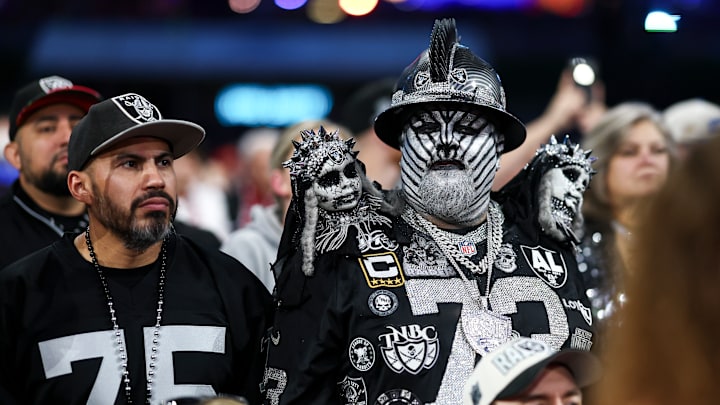The first draft of the Tom Telesco-Antonio Pierce era has come and gone. The Raiders made eight picks over the course of the weekend, four of them on offense and four of them on defense. Interestingly enough, their first three picks were all on offense, headlined by Georgia tight end Brock Bowers, who figures to be a major part of the Raiders' passing game this season.
One notable absence from the Raiders' draft class? Quarterback. And maybe that's not so surprising considering they just handed Gardner Minshew a two-year, $25 million contract, but considering all the rumors and speculation about the Raiders trading up to take a QB this weekend, it's a bit surprising to see them not do anything at the position at all. Still, it was a productive weekend for Vegas, and here's how the internet is grading their draft performance.
NFL Draft Grades: Rounding up Raiders grades from league experts
ESPN: B
"New GM Tom Telesco and coach Antonio Pierce, who led the team to a 5-4 finish after taking over as the interim coach, brought in Gardner Minshew to compete with Aidan O'Connell at quarterback, which meant the Raiders were never a lock to take a QB in Round 1. The fact is six quarterbacks were taken ahead of their pick at No. 13, so we never even got to have a conversation about their QB need on the broadcast. I wouldn't have been in favor of trading up for Michael Penix Jr. or Bo Nix, so I don't mind that Telesco and Pierce stood pat. Still, we might be back in 2025 having this same conversation if Las Vegas struggles and ends up with a high selection."
Bleacher Report: B+
"Thanks to an early run on quarterbacks and tackles, Georgia tight end Brock Bowers fell to the Las Vegas Raiders at No. 13. Getting Bowers there was a tremendous value for Las Vegas, as he was the second-ranked overall prospect on the final B/R big board. Las Vegas had no reason to get overly aggressive in its pursuit of a quarterback. Aidan O'Connell showed promise as a rookie, the Raiders signed Gardner Minshew in free agency. Instead, the Raiders stayed put and landed one of the most dynamic playmakers in the draft. With Bowers, Davante Adams and Jaboki Meyers in the fold, the 2024 Raiders offense should be a ton of fun."
Washington Post: C-
"Getting TE Brock Bowers with the 13th choice was more than acceptable. He was the draft’s most promising tight end by a wide margin and could be a difference-maker. The Raiders got excellent value by landing center Jackson Powers-Johnson in the second round. But it’s a QB-driven league, and the Raiders were the only team with a major QB need and a top-13 pick not to get one of the six prominent QBs available. Now they must try to get by with Gardner Minshew II and Aidan O’Connell."
NFL.com: B-
"Richardson is exactly the kind of NFL-sized, physical corner the Raiders required. Eichenberg will be a reliable inside player for many years. Laube was a nice pick in the sixth round who will get carries off the bench and be a special teams ace. No quarterback was selected to enter the competition between Aidan O'Connell and Gardner Minshew, so that position should be their top priority in rookie free agency."
USA Today: B-
"A team that openly coveted a quarterback – or, at least, new HC Antonio Pierce did – had been frozen out of the market entirely by the time the 13th pick rolled around Thursday. Maybe they miscalculated, maybe first-year GM Tom Telesco played it conservatively as he tended to do with the Chargers. Regardless, the Silver and Black regrouped to get Bowers in Round 1 and Oregon OL Jackson Powers-Johnson in Round 2, both plug-and-play starters and likely impact players."
Pro Football Focus: B+
"With the top six quarterbacks off the board, the Raiders go with a “best player available” approach despite taking tight end Michael Mayer in the second round of the 2023 NFL Draft. Bowers is a versatile offensive weapon and should be an immediate impact player thanks to what he can do with the ball in his hands. Bowers’ 689 receiving yards after contact during his college career at Georgia are more than any other tight end since PFF began charting college football in 2014."
